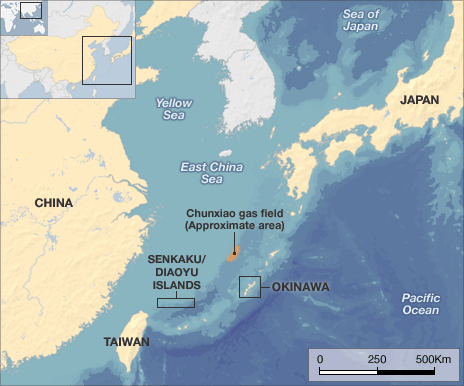
Japanese – China Conflict “All About Oil”
 It was planned to be the year of friendship between China and Japan, but instead we have a brewing conflict over oil.
It was planned to be the year of friendship between China and Japan, but instead we have a brewing conflict over oil.
The headlines of the burgeoning diplomatic spat between China and Japan may be about “disputed islands” but make no mistake, this is a conflict over oil.
It was all meant to be so different: this year is the 40th Anniversary of normalised relations between the two nations, but instead of peace, people are now even talking of war.
Yesterday, tensions rose even further as eleven Chinese warships raced to the disputed Senkaku archipelago, over which both countries claim sovereignty.
A flotilla of around 1,000 Chinese fishing boats is also said to be heading for the islands.
In fact to the Chinese the islands are called not the Senkaku, but the Diaoyu. The islands were handed to the Japanese after the Second World War, but China argues that it has a prior sovereignty claim. Taiwan also claims sovereignty too.
The latest protests have been sparked by the fact that Japan recently purchased several of the islands back from a private Japanese owner. The Chinese are outraged by the de facto nationalisation.
The last week has also seen violent anti-Japanese demonstrations in over 100 cities across China.
Most analysts argue this is a conflict over oil. “It all comes down to black gold”, argued the New Scientist yesterday. “There is potential oil and gas,” Pui-Kwan Tse of the US Geological Survey told the magazine.
Writing in the Financial Times this morning, Tim Taylor of international law firm SJ Berwin, agrees: “At stake in the East China Sea (and in a separate row in the South China Sea) are not the barren rocks themselves but the oil and gas that might be found under surrounding waters.”
This region is said to hold as much as 213 billion barrels of oil and 900 trillion cubic feet of natural gas, but no one knows precisely how much oil or gas there is. Back in the late sixties a United Nations report suggested that “Sediments beneath the continental shelf… are believed to have great potential as oil and gas reservoirs.”
One analyst for Resource Investor argues that the increasingly hostile situation could get ugly and “can and will affect the United States.”
Firstly, “if it succeeds in grabbing and holding the China Sea region and all its treasures, China will preclude any chance the US might’ve had at accessing those resources” and second “a China-controlled China Sea could impact the navigation paths of both commercial shipping, and the US Navy.”
One thing is certain, where there’s oil, there is always trouble …
